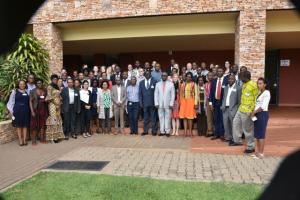Immunization and child health experts meet to revitalize home-based health records
Kampala, 24th February 2017 - Immunization and Child health experts are meeting in Kampala, Uganda to help revitalize Home-based records in selected African countries with high numbers of unimmunized children. Home-based records capture an individual’s vaccination status in a simple way and assist health workers to identify poor performing families and community for improved coverage with the necessary services.
“Home-based vaccination records play an important role in documenting immunization services received by individuals. However, current evidence suggests that these tools are too often underutilized, they vary in complexity across and sometimes within countries, and lack standardization in content, “noted the Minister of state for Primary Health Care Dr Joyce Kaducu in a speech read by Dr Bernard Opar the Program Manager of Uganda’s Immunization Programme at the opening ceremony.
Unfortunately, as Dr Joyce Kaducu pointed out, “the home-based vaccination record is too often underutilized or inappropriately used by parents and health care workers and therefore does not always fulfil its intended purpose”.
It is that concern that has brought together immunization and child health experts from Ethiopia, Cameroon, Liberia, Nigeria, Uganda and Rwanda as one of the best performers of using home based records and partners from UNICEF, CLARO, Bill and Melinda Gates Foundation and WHO to contribute to the improvement of Home-based records. The four day workshop also provides an opportunity to participants to put into action principles outlines in the WHO guidance on home-based records.
The Acting WHO Representative to Uganda Dr Tarande Manzila noted that deliberations of this important workshop “will allow countries to adopt the 2015 home-based record guidance manual in order to improve utilization and retention of the home-based records in respective countries”. This, he added, will contribute to improving vaccination coverage nationwide and enable countries to control of vaccine preventable diseases and to achieve elimination or eradication targets.
In an earlier presentation Dr Blanche Anya from WHO’s Regional Office for Africa reported that from 2000 to 2014 out of the 47 countries in WHO’s African Region only 14 had a Home-based record retention rate of more than 80% and only four had a rate of more than 90%. Eleven (11) countries had a retention rate of less than 50% while five countries had a rate of less than 30%.
In reference to that situation Dr Manzila noted that “by better understanding and then addressing the needs of the different home-based record users, the records can be improved, increasing their utilization and adoption”. Indeed in 2015, WHO developed a guidance document on home-based records intended to provide direction on how to improve the use and design of home based records.
“I hope we are going to come out with a nice approach and go home with a new way of thinking on the use and adoption of home-based records” said Ms Lauren Kendall Krause from the Bill and Melinda Gates Foundation one of the sponsors of the meeting. Mr Nasir Yusuf from UNICEF Eastern and Southern African Regional Office hoped that “the workshop will produce a user-friendly tool and address issues of availability, sustainability and use of the home-based tool”.
To meet those expectations experts meeting in Kampala will have to address challenges including shortages or Stock-outs of child health cards at health facilities, illegible or improperly completed records, loss and damage of the records and lack of importance placed on these documents by healthcare workers and caregivers. With those challenges addressed, home-based vaccination records will provide an inexpensive and effective tool for promoting childhood immunization and other health services.



